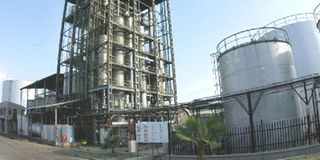How Kisumu got its industrial groove back

The Kisumu Molasses plant is one of the big industries that have made a comeback in Kisumu. Photo/JACOB OWITI
The past 30 years has seen industrial growth in Kisumu county swinging like a pendulum.
A boom in the late 80s and early 90s was followed by a lull in the late 90s through the early part of millennium.
But during the past five years growth has been on the up and up. The only exception has been fishing, where diminishing stocks in Lake Victoria have brought about a free fall.
During the late 90s, several industries closed, including Kisumu Cotton Mills (Kicomi), East African Breweries Limited (EABL) and Kenya Matches. The closures cost hundreds of workers their jobs and cast a shadow of uncertainty over would-be investors.
The closures were a result of normal market forces, experts said, and it was unfortunate if investors judged the viability of the county’s potential on these examples.
“EABL did not quite collapse as many perceive. The facility was established in Kenya to serve Uganda because at the time there was a civil war in Uganda which made investment in the country unfavourable,” said Israel Agina, regional vice chairman of the Kenya Association of Manufacturers. “At the end of the war, the brewer shifted base to Uganda for ease of operations.”
In the case of Kisumu Cotton Mills, the elimination of price controls and increased imports of mitumba was the leading cause of collapse. The situation was replicated in all the textile mills across the country because the imports were cheaper and easily accessible.
Spectre International, which produces ethanol for export, ceased operations in the 90s but saw a turnaround when Canadian investors took over in 2005.
Kisumu Town bore the brunt of negative politics after the region’s strongman Jaramogi Oginga Odinga fell out with President Kenyatta in 1969.
Since then, successive governments starved the region of funds for economic development.
As the population of Kisumu and the region grew, it soon became clear that Nyanza was an untapped market with great business potential; a point that came out clearly at the 2008 Nyanza Economic Forum.
The forum, which brought together regional political leaders and investors, was held with the aim of charting the way forward for Nyanza’s economic prosperity.
It came at a time when the region was reeling from the post-election violence which saw Kisumu suffer the flames of political ignorance and hate.
It emerged that there was urgent need to adopt sound economic policies pillared on infrastructural development and public-private partnerships.
Realise the fruits
It was through the adoption of that blueprint that Kisumu County slowly began to realize the fruits of industrial development.
The government has exhibited renewed commitment to development in the town, boosting investor confidence and promising a turnaround in the county’s fortunes.
Over the last five years, money spent on the infrastructure has been increasing on the back of a Nyanza-friendly coalition government and major roads not maintained for more than 30 years have been recarpeted and extended.
The Kisumu-Nairobi highway is almost complete while the Kisumu-Busia highway which joins the city to Uganda has been fully carpeted. The two highways have opened up Kisumu.
Under the northern corridor funded by the World Bank, Sh20 billion has been spent on recarpeting the Mau Summit-Kericho-Kisumu road.
The project will see a bypass created from Nyamasaria through Kondele, Obunga up to Kisat Bridge joining the main road from Kisumu to Busia.
In addition, about 18 kilometres of road are being upgraded within the town. The greatest incentive however, is the Sh3 billion airport expansion expected to upgrade Kisumu Airport to international status.
It will then handle direct flights, eliminating the need to route through Nairobi or Mombasa. The new airport and the expanded roads are expected to open up the county, making it accessible by road, air and water and raising its profile as a strategic industrial centre.
With the implementation of the East African Community protocol, Kisumu aims to become capital of the regional bloc. This has increased investor confidence and enticed industries seeking a strategic presence in the region.
Already, a number of agro-preneurs are thinking about setting up flower farms, while farming and fishing are also set to benefit.
Equator Bottlers recently unveiled a Sh1.5 billion bottling plant, Jumbo Mattress Co has established a factory at Ahero while Foam Mattresses is setting up a plant in the town.
Other companies setting up shop within Kisumu Town include Mayfair Holdings and United Millers, which recently completed the United Mall that hosts businesses including Tuskys Supermarket and Fox theatres.
United Millers chief Punit Shah commented: “Kisumu is a good place for business. We are close to Uganda both by road and water.”
In a bid to expand the town’s capacity and attract more investors, private partners and donors are being sought to provide capital for development. Projects underway are valued at almost Sh5 billion.
The French Development Agency has kicked off a Sh4 billion development fund through the Kisumu Urban Project to revamp the town’s outlook, which includes slum upgrading, new shops and markets, public building and road improvements, waste management and training.
The plan to make four primary schools centres of excellence is also underway, funded by German bank KFW for Sh550 million.
For its part, the town council has started major traffic reorganisation with all buses, taxis, matatus and boda bodas banned from the Central Business District.
The council is funding three major bus parks and a trailer park at Nyamasaria, Mamboleo and Otonglo.
The port of Kisumu has also been identified as an untapped resource, largely because of the problems caused by the water hyacinth which hampers navigation.




